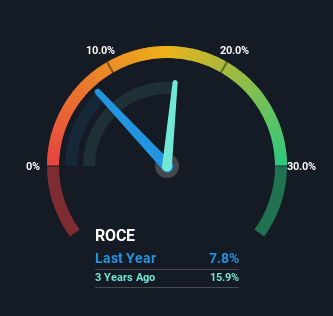If we want to find a stock that could multiply over the long term, what are the underlying trends we should look for? One common approach is to try and find a company with returns on capital employed (ROCE) that are increasing, in conjunction with a growing amount of capital employed. This shows us that it's a compounding machine, able to continually reinvest its earnings back into the business and generate higher returns. However, after briefly looking over the numbers, we don't think YouGov (LON:YOU) has the makings of a multi-bagger going forward, but let's have a look at why that may be.
Understanding Return On Capital Employed (ROCE)
If you haven't worked with ROCE before, it measures the 'return' (pre-tax profit) a company generates from capital employed in its business. The formula for this calculation on YouGov is:
Return on Capital Employed = Earnings Before Interest and Tax (EBIT) ÷ (Total Assets - Current Liabilities)
0.078 = UK£32m ÷ (UK£584m - UK£171m) (Based on the trailing twelve months to January 2024).
Thus, YouGov has an ROCE of 7.8%. On its own, that's a low figure but it's around the 9.7% average generated by the Media industry.
Check out our latest analysis for YouGov

Above you can see how the current ROCE for YouGov compares to its prior returns on capital, but there's only so much you can tell from the past. If you're interested, you can view the analysts predictions in our free analyst report for YouGov .
What The Trend Of ROCE Can Tell Us
When we looked at the ROCE trend at YouGov, we didn't gain much confidence. To be more specific, ROCE has fallen from 15% over the last five years. However it looks like YouGov might be reinvesting for long term growth because while capital employed has increased, the company's sales haven't changed much in the last 12 months. It may take some time before the company starts to see any change in earnings from these investments.
Our Take On YouGov's ROCE
Bringing it all together, while we're somewhat encouraged by YouGov's reinvestment in its own business, we're aware that returns are shrinking. Since the stock has gained an impressive 89% over the last five years, investors must think there's better things to come. Ultimately, if the underlying trends persist, we wouldn't hold our breath on it being a multi-bagger going forward.
Like most companies, YouGov does come with some risks, and we've found 2 warning signs that you should be aware of.
While YouGov may not currently earn the highest returns, we've compiled a list of companies that currently earn more than 25% return on equity. Check out this free list here.
New: Manage All Your Stock Portfolios in One Place
We've created the ultimate portfolio companion for stock investors, and it's free.
• Connect an unlimited number of Portfolios and see your total in one currency
• Be alerted to new Warning Signs or Risks via email or mobile
• Track the Fair Value of your stocks
Have feedback on this article? Concerned about the content? Get in touch with us directly. Alternatively, email editorial-team (at) simplywallst.com.
This article by Simply Wall St is general in nature. We provide commentary based on historical data and analyst forecasts only using an unbiased methodology and our articles are not intended to be financial advice. It does not constitute a recommendation to buy or sell any stock, and does not take account of your objectives, or your financial situation. We aim to bring you long-term focused analysis driven by fundamental data. Note that our analysis may not factor in the latest price-sensitive company announcements or qualitative material. Simply Wall St has no position in any stocks mentioned.
About AIM:YOU
YouGov
Provides online market research services in the United Kingdom, the Americas, the Middle East, Mainland Europe, Africa, and the Asia Pacific.
Established dividend payer and good value.
Similar Companies
Market Insights
Community Narratives



